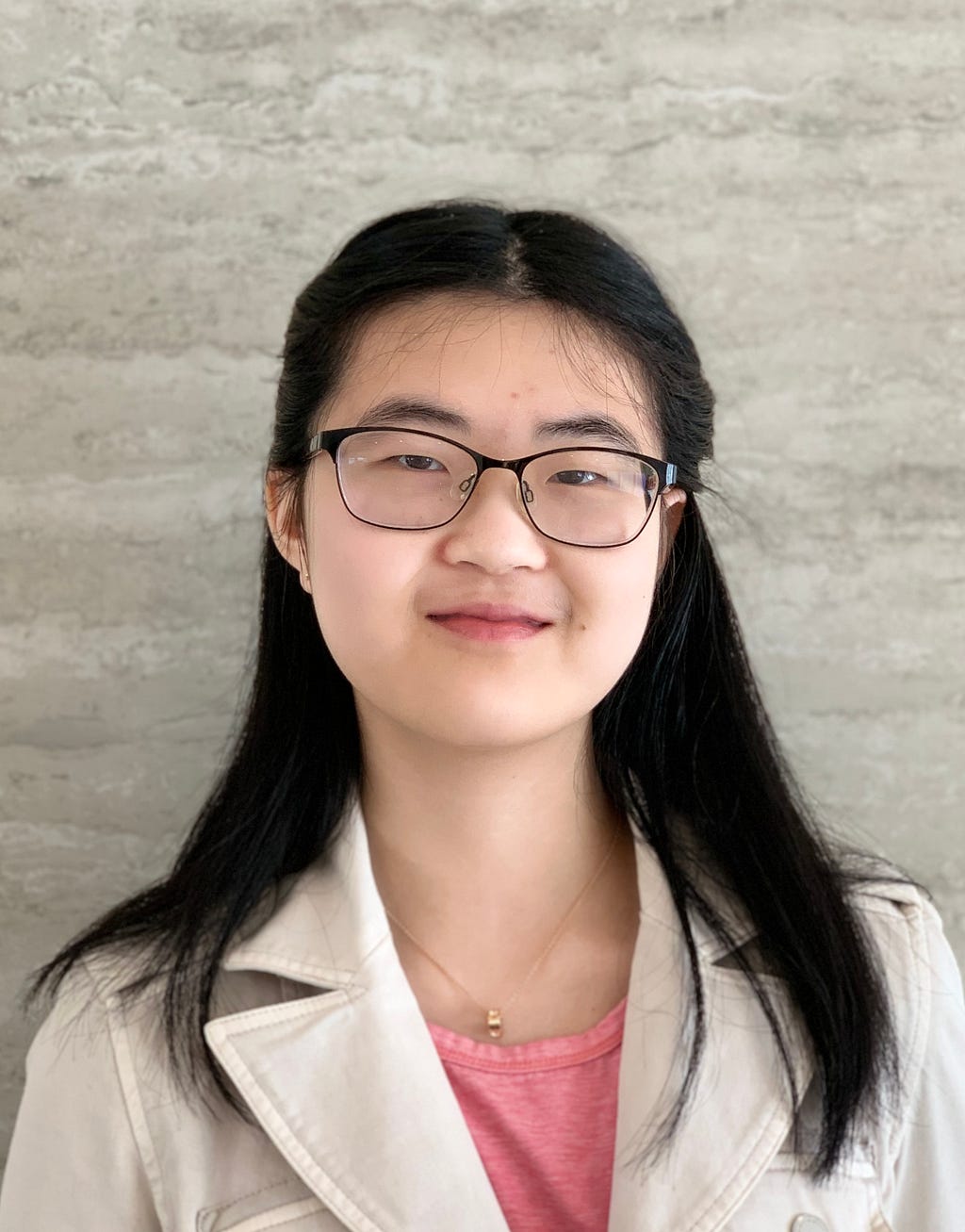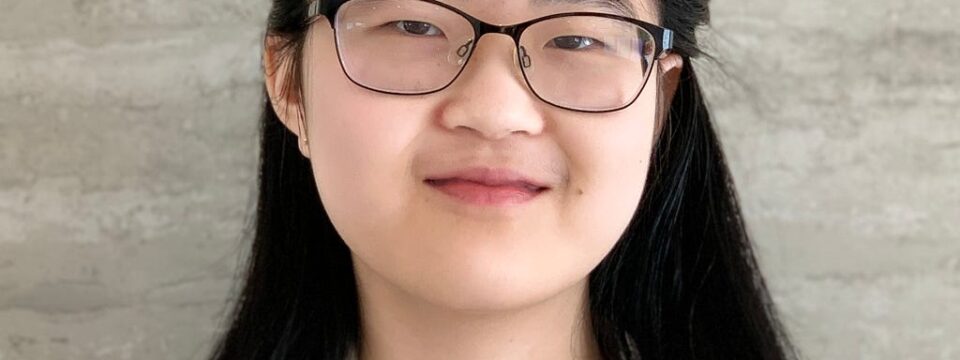
I can tell you the most important thing I wish I knew. Don’t be discouraged when you can’t find a perfect solution to the problem that you want to solve because it might give you information that can lead to a new perspective and a different approach to solve it. When I started to research food waste, I spent a lot of time looking at the transportation from farm to table. Because the entire food supply chain was so complicated and I was not able to find an effective solution to tackle the overall problem. However, through my research, I found that grocery stores are responsible for 10% of all U.S. food waste, so I decided to focus on reducing fresh food waste at grocery stores. The focus allows me to come up with the solution of FoodTLK.
As part of my series about young people who are making an important social impact”, I had the pleasure of interviewing Alyssa Lin.
Alyssa Lin is a junior at Bellevue High School located in the state of Washington. She is the podcast host of a Women’s Journey in Tech. highlighting Asian American women in the STEM field. Alyssa Lin’s goal is to share their stories and empower girls interested in pursuing their passions in technology. For more information please visit: https://rss.com/podcasts/womenintech/.
Thank you so much for joining us in this interview series! Before we dig in, our readers would like to get to know you a bit. Can you tell us a bit about how you grew up?
My parents are first generation immigrants from China. They both are software engineers and work for technology companies. I had many opportunities to explore my hobbies and interests growing up and my parents have always been very supportive. When I was in elementary school, I one time expressed my interest to go to a furniture building summer camp, and although my parents were worried about my safety when using power tools, they saw how excited I was and supported my choice to go to camp. It was one of the most fun camps that I’ve been to.
Is there a particular book or organization that made a significant impact on you growing up? Can you share a story or explain why it resonated with you so much?
I came across an article from the Guardian, “Cutting food waste by a quarter would mean enough for everyone” that spotlighted the issue of food waste. I have been interested in climate change and the factors that contribute to it since I learned about it in 4th grade. Looking at crates of bruised apples at a local QFC store, I thought about all those people who stopped by the fresh produce section, checked the price, and walked away. This inspired me to look for a solution to reduce food waste and make fresh food more affordable for people.
How do you define “Making A Difference”? Can you explain what you mean or give an example?
Making a difference for me is making the world a better place than when I found it, and it means I can help society continue to make progress on important issues. Reducing the amount of food waste will protect our environment and improve peoples’ quality of life.
Ok super. Let’s now jump to the main part of our interview. You are currently leading an organization that aims to make a social impact. Can you tell us a bit about what you and your organization are trying to change in our world today?
63 million tons of food are wasted every year in the United States, and food waste has become a big contributor to climate change. My startup, FoodTLK, aims to reduce food waste and make fresh food more affordable for people by combining smart labels with machine learning. FoodTLK uses color-changing smart labels to track the freshness of produce and provides a fully-managed service powered by machine learning to recommend price changes for grocery stores. Consumers can pay a premium for fresh food at peak condition, and those who are more cost conscious can save by purchasing foods that are still good but past peak condition. This tiered pricing model makes fresh foods accessible to a wider audience, thereby reducing the amount that is unsold and ultimately wasted.
Many of us have ideas, dreams, and passions, but never manifest them. We don’t always get up and just do it. But you did. Was there an “Aha Moment” that made you decide that you were actually going to step up and do it? What was that final trigger?
I’m curious about where food was wasted in the food supply chain, so I started to research and found that grocery stores are responsible for 10% of the 63 million tons of food wasted every year in the United States. Volunteering at the food bank, I know that fresh food donations are not an option because of health concerns. Smart labels are an existing technology, but the adoption at grocery stores is slow because retailers worry that the labels might encourage costumes to buy only the newest product. On the other hand, consumers generally want better quality vegetables and fruits, but most of them are either priced out or are unwilling to pay a premium without clear quality indications. At the time I was taking AP Computer Science at school, and I started to build a pricing simulator to validate whether a store can maintain at least the same level of profit margin by changing the price based on food freshness. The simulator confirmed this hypothesis positively. That was the “Aha Moment” for me to create a business plan for FoodTLK.
Many young people don’t know the steps to take to start a new organization. But you did. What are some of the things or steps you took to get your project started?
I was unsure at first if my idea could solve the problem so I did a feasibility assessment to see if grocery stores could make a profit using a multi-tier pricing model. I created a computer simulator for a three tier pricing model based on price elasticity of demand. I submitted my project to the Washington State Science and Engineering Fair (WSSEF) to get professional feedback on the idea. The judges were excited by the potential of the proposal, and I was awarded 2nd place in the WSSEF and a Sustainability award. Encouraged by their feedback, I created a business plan and submitted it to Blue Ocean Competition and Genius Olympiad. These help me to think through product definition and development, go-to-market strategy, and operation plan.
Can you share a story about the funniest mistake you made when you were first starting? Can you tell us what lesson or take away you learned from that?
At first, I searched for the most advanced smart labels. When I was working on the P&L (profit and loss) for FoodTLK, I realized that the profit margin at grocery stores is very narrow. The cost of smart labels has to be at most 2 to 3 cents for the solution to be feasible. That was a moment of reality for me. I realized that the most suitable product is better than the fanciest product. We don’t need a Cadillac if a bicycle can do the job.
None of us can be successful without some help along the way. Did you have mentors or cheerleaders who helped you to succeed? Can you tell us a story about their influence?
Since I was young, my parents encouraged me to explore my interests regardless of if they were typical for little girls. In high school I joined Girls Who Code and was puzzled by the lack of women in technology. I used LinkedIn to reach out to women in the field, asking them about their motivations and journey. Surprisingly, they eagerly responded. These software developers, test engineers, and executives told me stories, including struggling with circuit design in college, leading a team of engineers for the first time, and dealing with a tough customer situation. More importantly, they discussed how they handled challenges and grew. These stories inspired me to share my learnings with other teenage girls, so I compiled the interviews and launched a podcast highlighting minority women in technology.
Without saying specific names, can you tell us a story about a particular individual who was impacted or helped by your cause?
I am mentored by a professor of economics at Michigan State University who encouraged me to learn more about price elasticity of demand when I created my pricing model. After I sent her my paper, she suggested adding the consumer demographics to the model and look deeper into the food supply chain. Her feedback helped me become more confident about the direction of this project and I believe that FoodTLK is on a path to have a large impact.
Are there three things the community/society/politicians can do to help you address the root of the problem you are trying to solve?
Let me focus on my biggest ask. The community can help by raising the awareness of food waste and promote Environmental Sustainability Goals (ESG). As Larry Fink, Blackrock CEO, explained in his 2022 letter to shareholders, “every sector will be transformed by new, sustainable technology,” and that “the tectonic shift towards sustainability […] is just beginning.”
Fantastic. Here is the main question of the interview. What are your “5 things I wish someone told me when I first started” and why? (Please share a story or example for each).
I can tell you the most important thing I wish I knew. Don’t be discouraged when you can’t find a perfect solution to the problem that you want to solve because it might give you information that can lead to a new perspective and a different approach to solve it. When I started to research food waste, I spent a lot of time looking at the transportation from farm to table. Because the entire food supply chain was so complicated and I was not able to find an effective solution to tackle the overall problem. However, through my research, I found that grocery stores are responsible for 10% of all U.S. food waste, so I decided to focus on reducing fresh food waste at grocery stores. The focus allows me to come up with the solution of FoodTLK.
If you could tell other young people one thing about why they should consider making a positive impact on our environment or society, like you, what would you tell them?
Society is made up of individuals and progress is made through collaborative efforts. No significant change can be achieved through only the efforts of one person. It takes the community to fight for positive change in a world that everyone depends on. Each of us should consider making a positive impact because the collective us is the community.
Is there a person in the world, or in the US with whom you would like to have a private breakfast or lunch with, and why? He or she might just see this, especially if we tag them. 🙂
I would like to meet Sam Altman, OpenAI CEO, to ask about his viewpoint on the future of AI and how we can build responsible AI technology to improve the quality of life for human beings rather than to harm humanity.
This was very meaningful, thank you so much. We wish you only continued success on your great work!
Young Change Makers: Why and How Michele Smith Is Helping To Change Our World was originally published in Authority Magazine on Medium, where people are continuing the conversation by highlighting and responding to this story.
